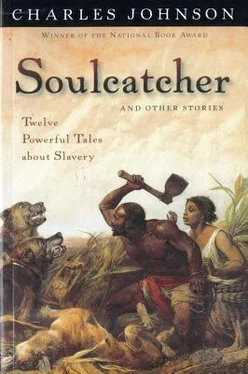It was, therefore, a befuddled and disheveled Mayor who finally reached City Hall by 2 P.M. and slumped heavily behind his desk, wondering if his heart might fail him once and for all after his morning's exertions. Everything he'd accomplished this morning (which wasn't much) had taken two — perhaps three — times longer to do. His secretary, a young man named Daniel, looked very sad that Thursday. He told the Mayor the people with whom he'd missed appointments were furious. Two entrepreneurs of enormous wealth and influence who'd traveled a great distance to see him — one a railroad man, the other a maritime merchant-felt insulted by what they called Hizzoner's "malfeasance" and planned to cancel further discussions of their proposed contracts and in the future only do business with other cities.
"No!" whispered the Mayor.
His secretary said, "I'm afraid so, sir. Your political rivals will make great capital of this. Your reelection is only months away, and you promised in the last campaign to improve commerce, shipping, and transportation."
"I know what I promised, damn it!" The Mayor pounded his desk. "But it's not my fault! Nothing's been normal today!" He leaned back in his seat, red-faced, and began pulling at his fingers. "All the Negroes are gone. Have you noticed that? What on earth happened to them?"
"What you agreed to, I guess," said his secretary.
" Me? What are you babbling about, man? Talk sense! I never told the Negroes to go away! Have you been drinking?"
"No, sir. I'm quite sober, insofar as it appears we both will be out of a job by November. I'm referring to the Compromise in Congress, which you fully endorsed."
"What does that have to do with our Negroes being gone?"
Quietly, his secretary stepped from the Mayor's office to his own room, then returned after less than a minute with a copy of a newspaper from the day before. "Perhaps you should read this. Please read it carefully, sir. Meanwhile, if you don't mind, I'd like to repair to my office in order to finish sending out copies of my résumé to potential, future employers. And I have a dreadful headache today…"
His secretary departed, leaving the Mayor more baffled than before. He opened the day-old newspaper, and there it was, the complex Compromise. In it, California became the thirty-first state. New Mexico and Utah were to be organized as territories and residents could decide for themselves whether to be free or slave. The slave trade was ended in D.C., and— Wait! He looked nearer, bringing the paper closer to his eyes in order to read some changes in the Fugitive Slave Act of 1793. Vaguely, he recalled this item, but hadn't attended closely to its details. Under the amendment, federal commissioners were granted the power to issue warrants for runaway slaves. They could form posses to capture fugitive blacks. They could fine citizens if they refused to help in returning Negroes to their former masters, who had to do nothing more than submit an affidavit in court. The blacks were denied a jury trial. They could not testify to defend themselves. Slowly, he put the newspaper down. His man Henry… their cook… their three other servants and perhaps all the coloreds in his city were runaways. No doubt theyd changed their names. And once they learned of the amendment to the Fugitive Slave Act, they'd fled en masse during the night, probably to Canada. Who could blame them? And he had endorsed this disaster?
Gloomily, the Mayor left City Hall. Night was coming on… and streetlamps were unlit. He plodded on, realizing that until now he'd not seen how dependent the life of the city — and his own fortune — was on blacks. They were interwoven, albeit invisibly, into the fabric of everything; and, like the dangling string on a sweater which, if pulled, unraveled the entire garment, so too their removal caused everything — high and low, private and personal — to collapse. Without sealing the deal on those contracts, he would lose his office. He was certain of that now. His own businesses would suffer. My God, he might even lose his mistress and be left with only his Wife, who sometimes could be a shrew! Miserably, he tramped back home in the snow, which seeped into his shoes and dampened his feet so thoroughly he felt his toes had frozen in one solid block of flesh by the time he reached his front door, coughing, his nose burning and running badly, because — yes — he'd picked up a nasty cold.
The house was colder and darker than before. If anything, he only wanted a little sympathy now from his Wife. He did not see her downstairs. So, blowing his nose into his handkerchief, he climbed the steep stairs to their bedroom, dripping all the way. "Dear," he said, opening the door, "I have some bad news…"
"Well," she crabbed, "you can save whatever it is until you find dinner for us. I haven't eaten all day. I'm starving! And so are the children!"
It dawned on him that she had not left their bed all day. "You couldn't find something for yourself in the kitchen?"
"Nothing's prepared! I haven't had to cook in years! You know that. I want you to go out right now and find us something to eat."
"Now?"
"Yes, now. "
Slump-shouldered, feeling euchered, the Mayor went back outside, walking two miles in the darkness, with fresh snow beginning to fall, flaking on his shoulders. An hour later he arrived at the building that housed his club, thinking perhaps there they would wrap four plates of food, which he could carry home to his family. He tried the door. It was locked. Inside no lights were on whatsoever. Then he saw a sign in the ground-floor window. NO WAITERS OR COOKS TODAY. He stared blankly, helplessly, at the words. His mouth wobbled. Of course, he thought, Of course…
And then Hizzoner broke down and wept in the snow.
"ALL RIGHT, YOU CAN interview me if you wish, but there's really not much to say. I think that white bier you see swinging over the street, just above our heads, with the legend THE FUNERAL OF LIBERTY says it all. Or over there — do you see it? — the union flag hanging upside down? Or there, on those shopkeepers' windows? They're draped in black because today we have collectively committed suicide in Boston. That's why you've got twenty thousand people out here today. We are dead. We are mourning ourselves as much as we are the decision that went against Anthony Burns. By returning that colored man to his master we have thoroughly undone the Revolution. We are not who we say we are. There's nothing left, I'm telling you, but lies and hypocrisy. And so I feel ashamed to wear this uniform. What's that? Yes, I resigned this morning as captain of the watch. Until this trial — this mockery of justice — came along, I was damned proud to be a Marine. My grandfather was with General Washington at Valley Forge. I grew up hearing stories every night at the dinner table about how the Tree of Liberty is watered with the blood of patriots. That's Jefferson, in case you didn't know, and from the time I was a boy I have believed that sentiment, sir, with all my heart and soul. I cut my teeth on the words of Thomas Paine. On his belief that our Revolution, our freedom, was worth protecting with my life, if need be. I was a soldier. My daily bread was duty and obedience to the nation I served. So yes, I suppose it seems odd that I disobeyed a direct order from my commanding officer to escort Burns from his jail in the courthouse in order for this contingent of men to march him back into bondage. But it's not odd, I'm saying. You can quote me on that. My refusal to be a party to the enslavement of another human being is of a piece with my grandfather's resistance to British oppression during the war. There's the rub! D'you see what we've become? By holding the Negroes in slavery we are the very enemy we fought in 1776. As a patriot to the principle, if not this wretched Government that intensified the Fugitive Slave Act four years ago, I have chosen to leave the military that has been my life. Now tell me again, what newspaper did you say you represent?"
Читать дальше












